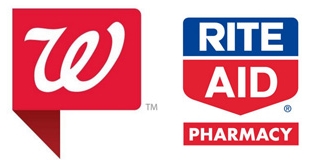
Most of you know by now that Walgreens, the largest drug chain in America, is set to acquire Rite Aid, the third largest chain. Assuming antitrust regulators approve the deal, which Reuters said would close in the second half of 2016, I wondered what effect it will have on the DRTV business. So I asked a few veteran drug-chain reps for their opinions.
The acquisition "will be a disadvantage for many ASOTV vendors," said Mike Govindani of Screen 2 Store. "The overall store count will decrease as Walgreens will ultimately close non-profitable stores and those that are in the same vicinity as an existing Walgreens location. The net result will be less doors -- at least in the short term."
Several other reps I spoke to confirmed this and recalled the negative impact of past consolidations, such as the CVS acquisition of Long Drugs in 2008 and the Walgreens acquisition of Duane Reade in 2010. "We did a lot more business between the two," said one rep, speaking of the former consolidation. "Typically in an acquisition, many stores are closed down for various reasons, and it also causes disruption operationally for long periods of time to the existing business at both companies."
It seems the media is calculating the new Walgreens store count without factoring in closures. For example, CNN Money reported that, post-acquisition, Walgreens would have "nearly 13,000 U.S. stores ... (which) would catapult the merged company above CVS, which has 7,800 stores." But every insider I spoke to said the new whole won't equal the sum of the parts -- or even close to it. Word is the number of Rite Aid stores closing could be 25 percent or more, one insider told me.
Putting aside the issue of less doors, such consolidations have their pros and cons, the reps explained. Managing campaigns becomes easier, but failing to get into an account is all the more devastating. "If Walgreens passes on an item, it's a major blow to any vendor that's supporting their SKU with heavy media," Govindani said. "This is especially true if their retail campaigns are subsiding their media spending."